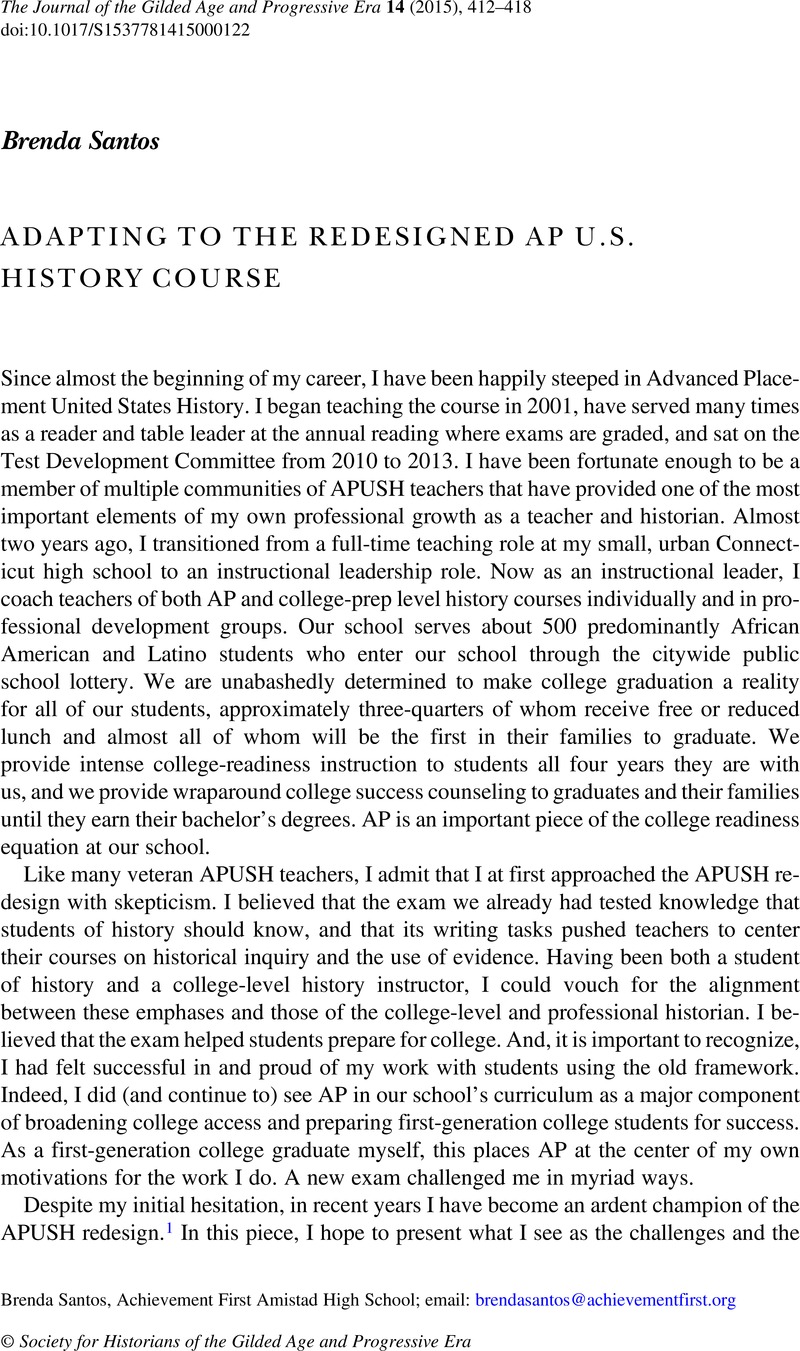No CrossRef data available.
Article contents
ADAPTING TO THE REDESIGNED AP U.S. HISTORY COURSE
Published online by Cambridge University Press: 22 July 2015
Abstract

- Type
- Teaching Forum: Pedagogy and Controversy in The New Advanced Placement U.S. History Framework
- Information
- Copyright
- Copyright © Society for Historians of the Gilded Age and Progressive Era 2015
References
NOTES
1 Brenda Santos, “Embracing the Challenge of the New AP US History Exam,” Perspectives on History (Sept. 2014), http://historians.org/publications-and-directories/perspectives-on-history/september-2014/embracing-the-challenge-of-the-new-ap-us-history-exam.
2 Republican National Committee, “Resolution Concerning Advanced Placement U.S. History (APUSH),” https://cdn.gop.com/docs/RESOLUTION_CONCERNING_ADVANCED_PLACEMENT_US_HISTORY_APUSH.pdf; Cory Turner, “The Great U.S. History Battle,” NPR Ed, aired Feb. 24, 2015, http://www.npr.org/blogs/ed/2015/02/24/388443955/the-great-u-s-history-battle.
3 James McPherson, “Revisionist Historians,” Perspectives on History (Sept. 2003), http://www.historians.org/publications-and-directories/perspectives-on-history/september-2003/revisionist-historians.
4 Grant P. Wiggins and Jay McTighe, Understanding by Design (Alexandria, VA : Association for Supervision and Curriculum Development, 2005).
5 Other explicit connections between content knowledge and higher-order thinking skills include those made by the Common Core State Standards and David Conley. The Common Core State Standards are “based on rigorous content and application of knowledge through higher-order thinking skills,” http://www.corestandards.org/about-the-standards/; and David Conley notes that students must learn the “what” in order to build “deeper knowledge.” David T. Conley, Getting Ready for College, Careers, and the Common Core: What Every Educator Needs to Know (San Francisco: Jossey-Bass, 2013).
6 Find these sources and others related to women's suffrage at the following sites: http://sfpl.org/pdf/libraries/main/sfhistory/suffrageagainst.pdf, http://ows.edb.utexas.edu/site/cks468edc370s/editorial-artifactscartoon, http://.tennessee.gov/tsla/exhibits/suffrage/struggle.htm.
7 Sam Wineburg, Historical Thinking and Other Unnatural Acts: Charting the Future of Teaching the Past (Philadelphia: Temple University Press, 2001); Lendol Calder, “Uncoverage: Toward a Signature Pedagogy for the History Survey,” Journal of American History 92 (Mar. 2006): 1358–70; Lesh, Bruce, “Making Historical Thinking a Natural Act,” Historically Speaking 12 (June 2011): 17–19CrossRefGoogle Scholar.
9 Gilder Lehrman Institute of American History, “AP US History Study Guide,” http://.gilderlehrman.org/programs-exhibitions/ap-us-history-exam-prep; Stanford History Education Group, http://sheg.stanford.edu/; “Beyond the Bubble,” https://beyondthebubble.stanford.edu/new-home; “Reading like a Historian,” http://sheg.stanford.edu/rlh.


